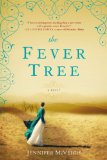Summary | Excerpt | Reading Guide | Reviews | Beyond the book | Read-Alikes | Genres & Themes | Author Bio

The Fever Tree is a compelling portrait of colonial South Africa, its raw beauty and deprivation alive in equal measure.
Having drawn comparisons to Gone with the Wind and Out of Africa, The Fever Tree is a page-turner of the very first order.
In London she was caged by society.
In South Africa, she is dangerously free.
Frances Irvine, left destitute in the wake of her father's sudden death, has been forced to abandon her life of wealth and privilege in London and emigrate to the Southern Cape of Africa. 1880 South Africa is a country torn apart by greed. In this remote and inhospitable land she becomes entangled with two very different men?one driven by ambition, the other by his ideals. Only when the rumor of a smallpox epidemic takes her into the dark heart of the diamond mines does she see her path to happiness.
But this is a ruthless world of avarice and exploitation, where the spoils of the rich come at a terrible human cost and powerful men will go to any lengths to keep the mines in operation. Removed from civilization and disillusioned by her isolation, Frances must choose between passion and integrity, a decision that has devastating consequences.
The Fever Tree is a compelling portrait of colonial South Africa, its raw beauty and deprivation alive in equal measure. But above all it is a love story about how - just when we need it most - fear can blind us to the truth.
McVeigh’s The Fever Tree is entrancing and provocative. It is a beautiful character drama and an insightful historical representation. This novel is not to be missed...continued
Full Review
 (926 words)
(926 words)
(Reviewed by Sarah Sacha Dollacker).
The discovery of diamonds in Kimberley changed the course of South African history. Prior to this find, South Africa was a colonial outpost that was sparsely populated by Europeans and native tribes.
The Dutch East India Company established a colony at the Cape of Good Hope in 1652 with the purpose of resupplying Company ships. Initially they had no interest in developing the hinterland but found that they needed to increase food supplies so released some of the Dutch farmers, known as Boers, from their contracts allowing them to set up farms which would supply the colony and ships. By 1806, when Dutch colonial power gave way to British control, the Boers had established control over large tracts of land but, being fiercely independent ...

If you liked The Fever Tree, try these:

The Creation of Half-Broken People
by Siphiwe Gloria Ndlovu
Published 2025
Stupendous African Gothic, by the winner of Yale University's Windham–Campbell Prize.

by David Diop
Published 2024
The hotly anticipated new novel by David Diop, winner of the International Booker Prize.
Believe those who are seeking the truth. Doubt those who find it.
Click Here to find out who said this, as well as discovering other famous literary quotes!